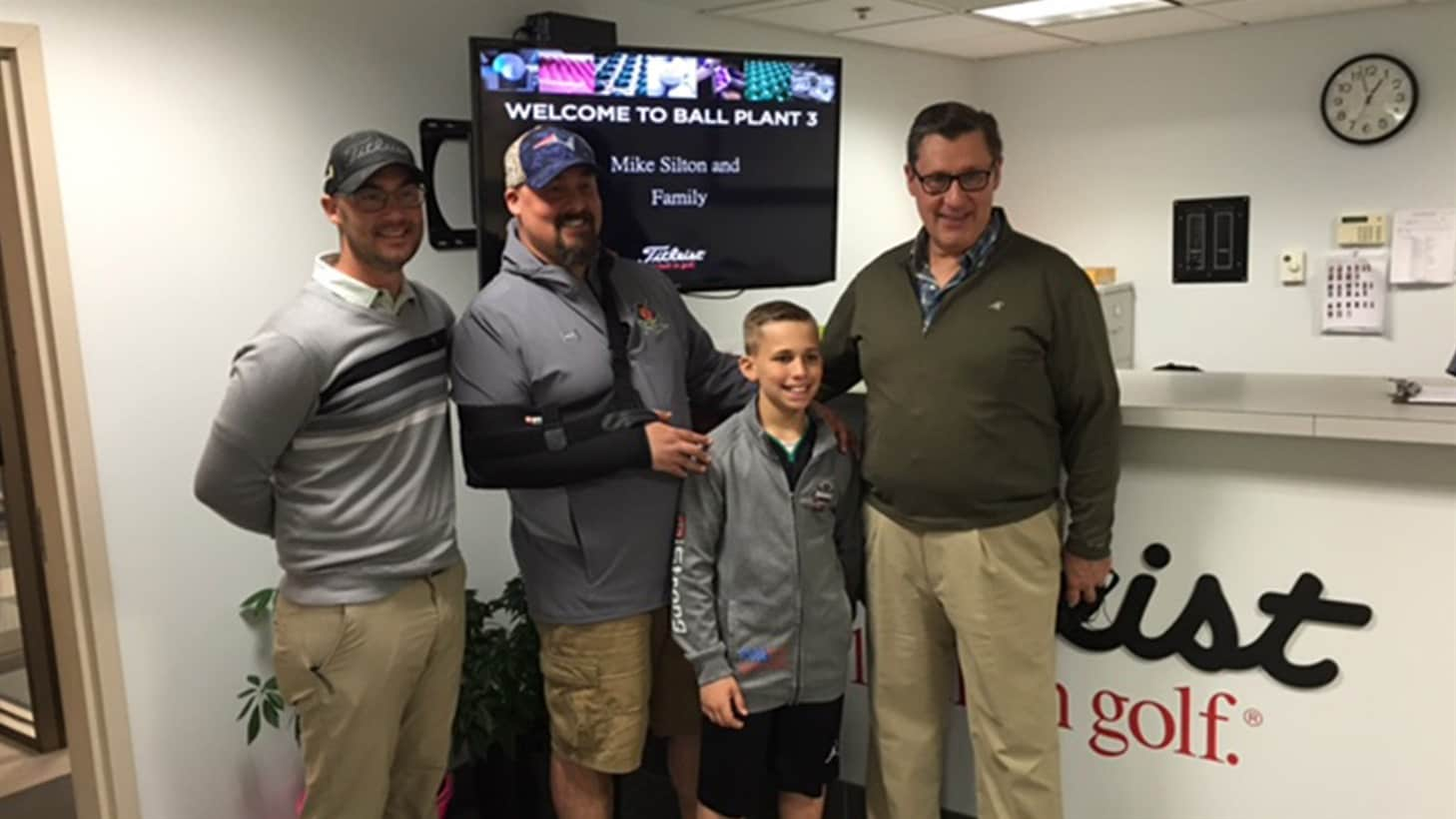
(The following story comes to us from Joe Gomes, Titleist Director of Communications)
It was eight years ago today, on a sunny Independence Day afternoon, when the booming voice of Boston Red Sox public address announcer Carl Beane proclaimed to the Fenway faithful:
"Today we welcome a heroic Sergeant for the U.S. Marine Corps First Marines Special Operations Battalion at Camp Pendleton, in San Diego, California.
On September 28, 2009, this special guest was badly wounded in a 20-hour Afghanistan firefight that took the lives of 19 fellow U.S. military members.
After multiple life-saving procedures, including an emergency tracheotomy on the battlefield, he began a painstaking rehabilitation. With loved ones by his side throughout the process and thanks to the financial assistance of the Marine Semper Fi Fund, he has made a remarkable recovery.
Joining us here this afternoon to throw out the ceremonial first pitch, please welcome a true American hero, Sergeant Aaron Silton.”
/teamtitleist/cfs-file/__key/telligent-evolution-components-attachments/13-944-00-00-00-11-46-61/001_5F00_C_2D00_2-Gallery.jpg
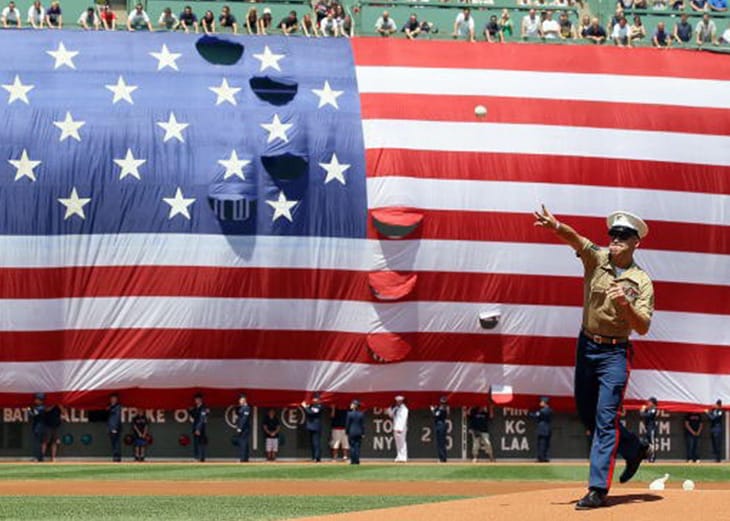 Sergeant Aaron Silton throws out the first pitch at Fenway Park on July 4, 2010. 1/1
Sergeant Aaron Silton throws out the first pitch at Fenway Park on July 4, 2010. 1/1
It was a celebratory day at the old ball park. A giant American flag was unfurled from the top of the Green Monster, draping the entire length of the famed left field wall; a four-member Color Guard stood at attention in center field as Master Sergeant Laura Noel performed a riveting, solo rendition of the National Anthem; a perfectly timed four-jet “missing man” flyover roared over the stadium as Noel concluded her final note; and a group of more than a dozen servicemen and women from every branch of the military declared “Play Ball!” in unison to get the game started.
As Sergeant Silton, a Westford, Mass., native, wound up and delivered the pitch to future Red Sox Hall of Famer Tim Wakefield, he felt a sharp pain in his shoulder. The ball hit the dirt, six inches in front of the plate.
• • •
It’s mid-May, 2018, and Silton is standing inside Titleist Ball Plant 3 in New Bedford, Mass., having just taken a tour of the manufacturing home for Titleist Pro V1 and Pro V1x golf balls with his father, Michael, brother David, and David’s son Kaden. Aaron is recounting his story. Actually, a compilation of many incredible, improbable stories that has led him to golf.
“Never in my wildest dreams would I have thought I would be playing or teaching golf,” Aaron said. “I never really even liked golf growing up. I would go to the driving range with my buddies and hit the ball as hard and as far as I could. That was the extent of it.”
In the aftermath of the firefight in Afghanistan, there was a period of three years in which Silton couldn't feel the right side of his body. Today, he has a clubhead speed of 116 mph and ball speed of 174 mph with his driver. Both above the PGA Tour average. He is a fast learner.
/teamtitleist/cfs-file/__key/telligent-evolution-components-attachments/13-940-00-00-00-11-46-55/001_5F00_Gallery-3.jpg
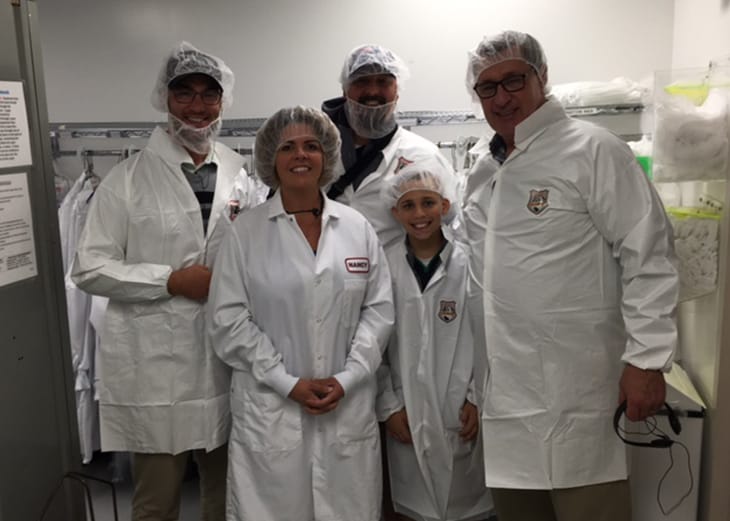 Suited up and ready to tour Ball Plant 3 paint operations. From left to right:
Aaron Silton, Nancy Moniz, Titleist Ball Plant 3 Tour Guide, David Silton, Kaden Silton and Michael Silton.1/1
Suited up and ready to tour Ball Plant 3 paint operations. From left to right:
Aaron Silton, Nancy Moniz, Titleist Ball Plant 3 Tour Guide, David Silton, Kaden Silton and Michael Silton.1/1
The Silton’s are a military family through and through. In fact, Aaron is a fourth generation military man. His brother received a Purple Heart for his service as a U.S. Marine in Iraq in 2004. His sister Shayna currently serves as a Navy nurse in Virginia.
Aaron’s dream was to attend the U.S. Naval Academy in Annapolis. “But I didn’t believe I would ever have the grades to get in,” he said. “Not because I wasn’t smart enough, but I didn’t apply myself. I knew in eighth grade that I was going to enlist, so I bided my time, finished high school and was off.”
A three-sport athlete (soccer, hockey, lacrosse) at Westford Academy, Aaron initially tried to register without his parents’ knowledge. At 17 years old, however, he needed their permission and a signature.
When Aaron first entered the Marine Corps, he was tasked with accounting work. “I hated it. And I sucked at it,” he said. “I did that for about three months and then I got pulled up because my first sergeant had a Recon (Reconnaissance) tie-in.” He was going to get his chance.
“I remember they pulled 50 or so men, boys really, into a room, and they said ‘Who wants to try Recon?’ I was sitting up front and raised my hand. When I looked back I was the only one. And I’m like, ‘OK.’ I had no idea what the job entailed, I just knew it was an opportunity.”
Aaron quickly rose through the ranks. He was selected to join the Marine Special Operations Command which is MARSOC. Only the best of the best are considered, and he was one of just 21 in a class of 177 that persevered through the grueling testing process. He joined a Marine Raider team whose core capabilities were direct action, special reconnaissance, foreign internal defense, counter-terrorism and information operations anywhere around the world and at a moment’s notice.
“I went through all these tests and the thing is you never quit, right? If you’re on a rough run, you don’t know how long it is, it doesn’t matter. So you always give 100 percent no matter what.”
/teamtitleist/cfs-file/__key/telligent-evolution-components-attachments/13-942-00-00-00-11-46-57/001_5F00_Gallery-1.jpg
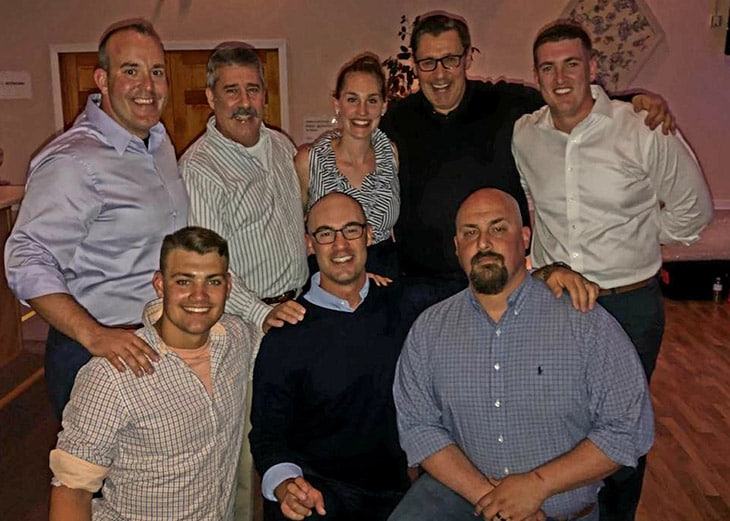 Some of the Silton family military at a recent family gathering:
U.S. Marines (Front row): Aaron's nephew Tyler Silton, Aaron Silton, brother David Silton
U.S. Navy (Back Row): Brother-in-law Michael Bettencourt (Coast Guard), uncle Peter Silton, sister Shayna Silton, father Michael Silton and brother-in-law Jordan Codrey. 1/1
Some of the Silton family military at a recent family gathering:
U.S. Marines (Front row): Aaron's nephew Tyler Silton, Aaron Silton, brother David Silton
U.S. Navy (Back Row): Brother-in-law Michael Bettencourt (Coast Guard), uncle Peter Silton, sister Shayna Silton, father Michael Silton and brother-in-law Jordan Codrey. 1/1
Aaron had been on reconnaissance missions and training exercises in the Philippines, Indonesia, South America and Iraq years before deploying to Afghanistan. He was there for approximately two months before embarking on the mission that would alter the trajectory of his life. He was 24 years old.
Aaron already had dispatched several enemy Taliban and avoided other fatal encounters in the long, massive firefight throughout that steamy September day and night. The battle took the lives of 12 Marines, six Army Rangers and the captain of the U.S. Marine Corps Special Recon Battalion. Aaron was struck by a bullet that was fired from 1,000 meters away and went through the jaw, his throat, and out his carotid.
“If there weren’t two other guys on his team with him at that moment …,” recalled his father Michael, pausing to compose himself. “They trached him on the spot.”
As Aaron’s comrades tried to lift and carry him back to the truck for medical attention, he pushed them away and walked the half of a kilometer himself.
Michael received a phone call from a Master Sergeant shortly after Aaron was shot, telling him that his son was hit and on his way for treatment in Kandahar. Aaron was conscious enough at that point to sign his name to forms provided by the medical staff before being cleared for transport to Germany.
“We were at the Medical Center in Landstuhl, Germany within 30 hours of that first phone call,” said Michael. “I’ll never forget walking in and his neck was all splayed out. When I touched his hand and he squeezed my finger I knew he was there. But his eyes were just slits, man. That was tough.”
• • •
When a bullet hits bone, it splits apart. In Aaron’s case, a piece of it nicked his carotid artery. He developed a clot that went to his brain. Aaron suffered a massive stroke on his way from Kandahar to Germany.
Rationally, Aaron’s shoulder was the least of anyone’s concern.
As it turns out, the force of the bullet that Aaron took vaulted him into thick bushes and brush loaded with thorns. In the heat of the moment, while his fellow Marines tried to extricate him, they separated his shoulder.
Aaron was standing on a pitching mound in front of 37,000 people – nearly 10 months after he was shot – when he finally realized it.
“I went back to my unit in California after throwing that first pitch at Fenway and was like, ‘Hey Doc, I don’t know what’s wrong with my shoulder but it doesn’t feel right.’ It never really hurt before because I had the stroke up and down the right side of my body. I really couldn’t feel anything. But I told him that something is wrong.”
Because of shrapnel, the doctors could not conduct an MRI, so they did exploratory surgery “and sure enough the surgeon says, ‘Well, your shoulder is separated, you have a torn labrum and you have a torn rotator cuff.’ I’m like, gee.”
In retrospect, six inches short of the intended target feels like a perfect strike.
/teamtitleist/cfs-file/__key/telligent-evolution-components-attachments/13-943-00-00-00-11-46-59/001_5F00_C_2D00_1-Gallery.jpg
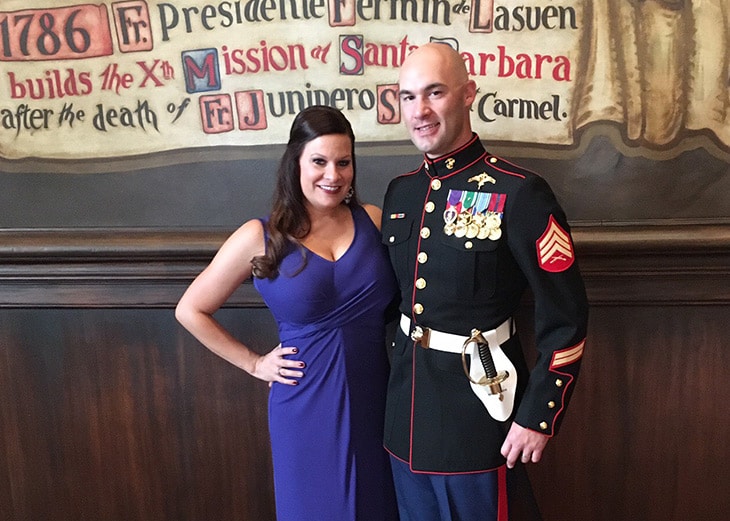 Tiffany and Aaron Silton. 1/1
Tiffany and Aaron Silton. 1/1
This is also a love story.
While stationed at Camp Pendleton, Aaron, always a picture of health and a strapping, competitive athlete, participated in a beach volleyball league. It was there, just six months before his injury, where he met Tiffany Couty. Tiffany was working as a director of a program for individuals with developmental disabilities - primarily brain injuries.
While Tiffany and Aaron were on different teams, they had mutual friends and would gather as a group for lunch and drinks after games. They became best friends before they even went out on their first date. Aaron was deployed to Afghanistan in July of 2009.
Tiffany can vividly recall when, two months later, she received the tragic news. In fact, she had a premonition of sorts.
“It was in the middle of the night. For whatever reason, I had this really weird, bad feeling throughout the whole previous day. Call it intuition, call it whatever you want, but I just had a feeling that something was wrong or off. And, sure enough, his brother called me, probably at 3:30 in the morning and he said, ‘Are you awake, I need to tell you something.’ I immediately said, ‘I knew it.’ That's the first thing I said to him, and he was like, ‘What are you talking about?’ "
" ‘Well, what are you going to say?’, Tiffany said. “He told me, and I just said, ‘I knew it. I just had a feeling something was wrong.’ At that point, none of us knew much of anything. They said he suffered a gunshot wound to his face. We didn’t know any details. The first thing you think ‘Is he going to die? Does he have a face?’”
“I hung up the phone and threw up,” said Tiffany. “And then I just waited, really, because there was nothing that we could do at that point.”
• • •
As the grueling rehabilitation process progressed, Tiffany’s commitment to Aaron never wavered.
When Aaron returned from Germany, he spent a stint in the ICU at the medical center in Bethesda, Md., where he was stabilized before being transferred to Hunter Holmes McGuire VA Medical Center in Richmond, Va., for an intensive inpatient physical therapy and rehabilitation program.
The first time Tiffany saw Aaron was about six days after he got shot. She traveled from California to see him for the first time that weekend.
“He was in the ICU and in and out of consciousness,” said Tiffany. “He definitely recognized me, but he was in pretty bad condition. I don't know if anyone really knew the extent of his injuries, including the doctors.”
Aaron’s jaw was wired shut. He was paralyzed on the right side of his body, which is his dominant side. He couldn't get MRI's or CAT scans because he had shrapnel too close to his carotid and there was concern that it would get into the veins, go up to his head and cause further brain damage.
“So when we were meeting with the doctors,” said Tiffany, “we all really just went into a kind of survival mode. It was, OK, let’s get done what we need to get done. I wasn't even thinking about where it's going to leave him. At that point I didn't care. It was getting him rehabilitated.”
When she had to leave to go back to work, Tiffany would receive updates by staying in constant communication with Aaron’s sister Rachel, who stayed with him the entire time.
By the second weekend, Tiffany was able to sit and talk to him, although he couldn’t respond since his jaw was wired shut. Because of the stroke, there was concern surrounding the extent of potential brain damage. But Aaron put that question to rest immediately.
“I remember he got angry at one of the therapists when she held up a pen and a pencil or a fork and a spoon and asked him to tell her which was which,” said Tiffany. “They were just trying to determine the extent of the damage because nobody truly knew at the time. He looked at her like, ‘Are you … serious? Do you think I'm an idiot?’ I explained to him, ‘We have no idea what you know and what you don't know, so even though the questions might seem dumb, you need to answer them because we have no idea if you actually know what a pencil is or not.’ At that point, I think something clicked.”
Tiffany brought him a mini-computer pad on which he could type in the letters because, as a right-hander he couldn’t pick up his right hand and he couldn’t write with his left, but at least he could type. It had YES and NO buttons. They would also communicate with simple sign language. As Tiffany put it, “it was just kind of just keeping him determined and not deterred.”
Tiffany had never dealt with the post-partum effects of a traumatic brain injury to this significance. The problem with Aaron’s injury was that it was the result of a stroke.
“It was very different yet similar to what I had been used to dealing with,” said Tiffany. “It was interesting learning this new perspective of a traumatic brain injury induced by a stroke, because it is very different than a blunt trauma brain injury that may have irreversible damage.”
Aaron progressed quickly, and when it was determined he was cleared to be released, he and Tiffany returned to San Diego, where they moved in together. They found a downtown apartment, right on the trolley line that stopped near Sharp Memorial, where Aaron participated in an intensive outpatient TBI (Traumatic Brain Injury) rehabilitation program.
• • •
When Aaron began his recovery process the center often used sports for rehabilitation.
“It was fantastic for Aaron because that's right in line with the way he would want to rehabilitate opposed to just kind of sitting with a physical therapist who's manipulating him. He would much rather be out and about doing something.”
So he started by bowling three times per week. He hated it. Tiffany encouraged him to ask what else was available. Right around that time the Wounded Warrior Project was hosting a golf tournament and invited Aaron. And even though he was never a fan of golf, he loved it.
“I remember him saying, ‘now this is something that I like!’, said Tiffany. “I think it was the solitude. It was him really using his brain to focus on something quiet. I don’t think he liked the bowling alley because it was loud. It was busy. There were people around. The golf course is a very different environment than a bowling alley. It was outdoors."
• • •
Aaron embraced golf when he returned to San Diego because he wanted to get better physically, and the swing would assist in helping regain the range of motion he lost due to his stroke. He still has shoulder and left hip issues that affect his rotation, but he continues to work through the physical part.
“Every day for the last three years I was in the Marine Corps I went to rehab from 7 a.m. to Noon and then I had a standing tee time at Marine Memorial Golf Course at Camp Pendleton,” said Aaron. “I played golf from 1:00 p.m. to dark, five days a week for three years. So, naturally if you do something for that long you improve, even if you don’t know what you’re doing.”
/teamtitleist/cfs-file/__key/telligent-evolution-components-attachments/13-946-00-00-00-11-46-65/001_5F00_C_2D00_3-Gallery.jpg
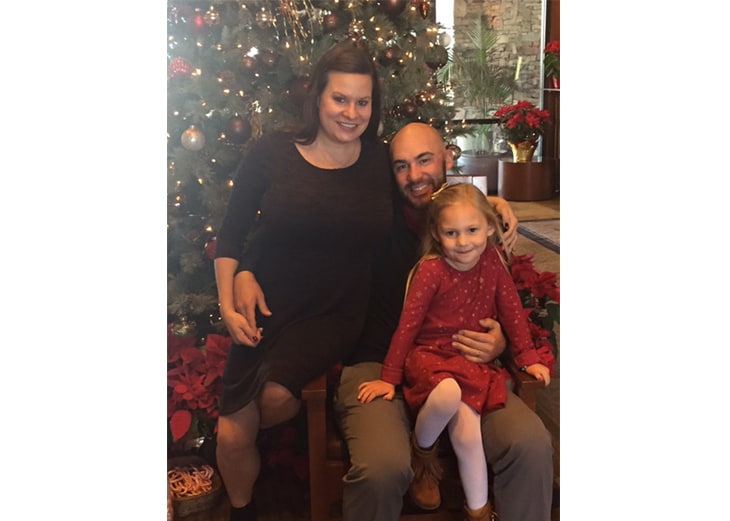 Tiffany, Aaron and Alexa Silton. 1/1
Tiffany, Aaron and Alexa Silton. 1/1
He started by shooting scores in the 130’s. He got frustrated at first, but he continued to improve. He has since passed his PGA Professional Playing Ability Test (P.A.T.), scoring in the mid-70’s. As he gained strength and dexterity, he progressed from a senior graphite shaft to an extra stiff shaft in his golf clubs.
Tiffany and Aaron were married in August, 2011. They eloped to Las Vegas with just their two best friends and her parents in attendance. It was her 30th birthday. They welcomed a baby girl Alexa in March of 2013.
He was formally medically retired from the military in 2012, and although he wasn’t happy about it – he planned on being a career man, of course – he dedicated his professional life to being the best golfer and teacher he could be, enrolling in the Golf Academy of America in Carlsbad. He was gifted a set of fitted golf clubs by the Wounded Warriors.
“Tiffany told me I was a better person to be around after I started playing golf,” said Aaron. “I was not that nice. I was angry about my situation. Very angry, honestly. When you’re over there a bunch of times (Middle East), you’re like, ‘what’s reality?’ Golf helped my mental state.”
Aaron channeled that anger into a focus on the golf course, and whatever stress he was having before or after his golf game that day, the anger went away for that period of time he was playing or practicing. Then it began to go away for longer stretches while he was off the golf course the more he funneled that passion into his game.
“The PTSD is something that will be with him forever, but we just started to find adaptive ways,” said Tiffany. “I mean, that's pretty much what I do for a living. Every single person can find something that they're deficit in and find a way that they've adapted to that deficit. That's essentially what we needed to do and we have for the most part.”
• • •
Susan Roll has been a golf professional for nearly 30 years and is co-owner of the Carlsbad Golf Center in California. An accomplished player and businesswoman, she has earned just about every award possible in the PGA Southern California section, as well as recognition and respect nationally as an instructor, expert club fitter and motivational speaker. It was in the latter capacity that brought her first interaction with Aaron.
The Golf Academy of America is a two-year golf college offering a degree in Golf Operations and Management with a curriculum of golf instruction and golf business management. The Academy has five campuses across the country and Roll was invited to speak at the commencement for the graduating class of 2014 at its San Diego/Carlsbad location. When she completed her remarks, Aaron approached her, introduced himself and thanked her for her inspirational message.
As fate would have it, Aaron was working in the bag room and as an assistant at Rancho Sante Fe Golf Club, a private golf club in San Diego County where Roll happened to be a member. Aaron was so excited about the opportunity to work for Susan that he remembers the day he was hired, working his last day at Rancho Sante Fe on September 27, 2014, and starting at Carlsbad Golf Center the next day. He has been a Titleist Staff Professional for over a year and is the primary fitting contact for Titleist equipment at the facility.
"When I learned of his story it brought me to tears," said Roll. "I remembered him telling me how I inspired him to pursue his passion to teach, when in fact, he was the true hero. We were fortunate when he accepted a club fitting position with us three years ago, and he has been the one that has been the inspiration to everybody he works with and with every golfer he fits."
Carlsbad Golf Center is annually ranked among the Top 100 Best Clubfitters in America by Golf Digest. Among the fitting team is Les Duer, a graduate of the U.S. Naval Academy, a retired Lt. Colonel, United States Marine Corps, and also a graduate of the Golf Academy of America. It's no coincidence that Les and Aaron bonded. In addition to being an expert fitter, Aaron organized a boot camp for junior golfers learning the game.
"If I had to choose one word to describe Aaron's demeanor, it would be disciplined," said Roll. "Obviously that comes, in part, from his military background, but he is disciplined in everything he does in his life, how he teaches his students and in his fitting sessions. He picks things up extremely fast and expects more from himself than anybody I know. He is a wonderful representative of our Golf Center and for Titleist and it shows in his interaction with every golfer with whom he works."
/teamtitleist/cfs-file/__key/telligent-evolution-components-attachments/13-945-00-00-00-11-46-63/001_5F00_C_2D00_4-Gallery.jpg
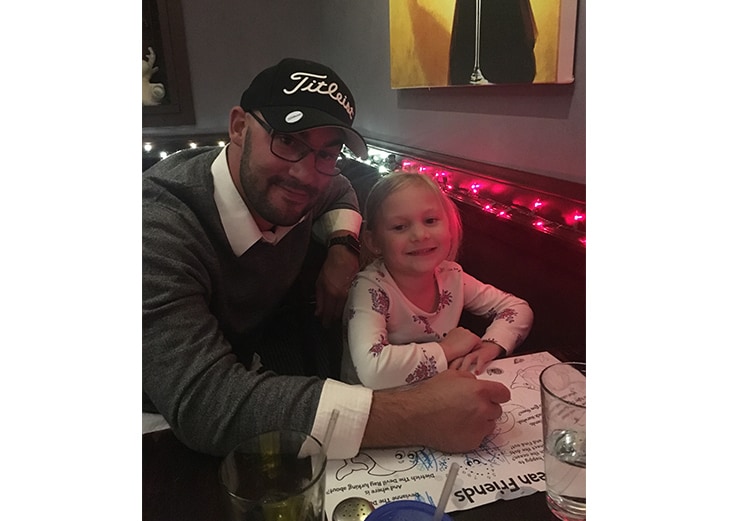 Aaron Silton and daughter Alexa. 1/1
Aaron Silton and daughter Alexa. 1/1
Prior to his injuries, Aaron Silton was the talkative, life of the party. He was an incredible athlete. He was an operator with one of the most elite groups in the United States military system. His whole life revolved around physical endurance and adapting to the most extreme physical and mental challenges.
“This is a guy that doesn't fail at anything he tries, and he wasn’t going to start now,” summarized his wife Tiffany. “He was going to get his life back. He pretty much decided with golf that, ‘I'm going to do this professionally one day. And then, he did it.”
Indeed, he did. And he is just getting started.
“I love where I am at the Carlsbad Golf Center,” concluded Aaron. “I love what we provide. I’m a club fitter and I love the teaching aspect. That’s what is really important to me. My ultimate goal, however, is to help veterans find their way.”
More specifically, Aaron wants to help the Wounded Warriors Project and his fellow veterans that were injured on the battlefield and still fight PTSD issues by starting his own clinic.
“I am here for them. I want to be their swing doctor for golf. I want to be the person who helps that warrior improve their quality of life because of their association with the game. My satisfaction will come in seeing the improvement of veterans that come to me, not just in golf, but in life. When I’m asked - ‘where are they now?’ - six months after we begin working together, I want to be able to show that progression and then I’ll know I’m making a real difference.”
Golf helped save Aaron Silton, and as he says it, “I just want to give back.”
#TeamTitleist